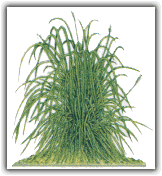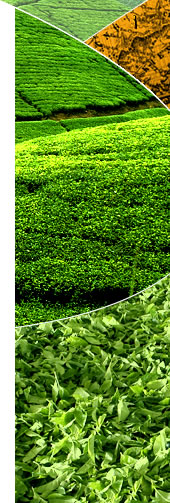| |
 |
![]()
Cooper's Chronicles: Lemon Grass
THE LIVELY LEMON GRASS
By Barry P.W. Cooper
A few years ago I was returning from South America after completing a field trip. Nestling in my baggage was a collection of herb tea samples, among them a large plastic baggie of Cymbopogon Citratus more commonly known as Lemon Grass.
 Immigration behind me, I stepped confidently forward for the Customs inspection. "These your bags Sir?" Asked a respectful inspector.Ê
Immigration behind me, I stepped confidently forward for the Customs inspection. "These your bags Sir?" Asked a respectful inspector.Ê
"Yes they are."
"Do you mind opening this bag sir?."
"Not at all" says I, flipping the catches and raising the lid to expose my collection of baggies, with the lemon grass sample bulging on top.
"Ahhhhha! What do we have here!" Crowed the inspector.
"Samples..." says I, beginning to feel a little weak at the knees. "Herb tea samples."
"Ho! Calling it herb tea are we?" asked the decidedly less respectful inspector.
"Ho! Yes."
"Don't be smart sir, you are not in a position to be smart......... sir!"
"No, really, they are herb tea samples," I managed to get out as I frantically searched for business cards, and supporting evidence to prove that I was not a drug smuggler. Anyway, to cut a long story short, I emerged from the customs hall an hour later, ruffled but with samples intact and blessing the U.S. Department of Agriculture representative at the Miami airport, who knew the difference between lemon grass and the other type of grass that can get you into a lot of trouble.
So what was this sample that almost got me arrested? Lemon Grass is found growing all over the world so it is not surprising that you can also find it in many herb tea blends. It is natural, it actually does taste like lemons, and because it is grass it is also relatively inexpensive.
These are powerful merits to rate inclusion in a tea blend, but all is not sunshine and light! Lemon grass does come with a few flaws. The lemon flavor it provides after being extracted in a mug of boiling water is distinctly oily, and consumers have been known to object to the "artificial" taste that results. This taste comes from the volatile oil in the lemon grass, the main component of which is citral a very pungent, irritating product that can penetrate through a blend with its distinctive character. This alone limits its use, but where it really becomes an issue is on the production floor. The product does not cut easily. In the field it grows tall and proud to a height of one meter. Once harvested, it has to be reduced to a tea bag cut size and here the troubles start.
Lemon Grass is a member of the Poaceae family which includes all the common grasses. Grass is a monocot versus a dicot, and now that I have made that clear, perhaps I should explain that monocots have parallel venations (veins), as against the net works of veins found in dicots. The long slender blades of the monocot, once dry, shatter into small fragments that under a microscope closely resemble needles. These needles, fly all over the place and nestle into every nook and cranny of the cutting machine, the pipes, the rafters, your clothes and your nose hair. It is not a pretty sight and clean up is long and arduous.
It also results in a very unsatisfactory density, the plague of all herb tea packers. Unlike black tea, which is normally uniform in size and will flow through a tea bag machine in a manner that would make a goose proud, herb tea blends are not uniform. They are a mixture of bark, seeds, roots, petals, leafs and, of course, grass. Getting a mixture like that into a small fixed volume like a tea bag is a challenge and nice, dense products like chicory root and hibiscus are much loved by herb tea blenders and herb tea production foremen.
Sophisticated processors have learned to overcome these problems by pelletizing a portion of the lemon grass so that the dense pellets combine with their cousins to make a heavier product. This principle is sometimes very difficult to explain to growers overseas who offer their lemon grass freshly cut from the nearest irrigation ditch at giveaway prices.
Lemon Grass flourishes in humid climes. It can be harvested several times in a season by cutting the upper portion of the leafy material which quickly grows back for a second cutting. Taste at origin has also been found to be a major obstacle. I have seen and tasted samples from India, Nigeria, El Salvador, Guatemala, Mexico, South Carolina, Thailand, Argentina, Hawaii and Chile just to mention a few. Each country had a very distinctive taste. Nigeria for instance had a product that tasted like soap. A very pleasant, aromatic soap, but definitely soap. India's offerings have always tasted earthy. Without question, Thailand, Mexico and Guatemala take pride in being the preferred place for quality.
Most of the Lemon Grass used in herb teas comes from one of these last three mentioned origins, but that is not to say that nestling in some drainage ditch is a variety that does not taste oily and will allow blenders to use it "straight."
So the search goes on for the perfect blade, and herb suppliers and blenders will continue to be questioned by U.S. Customs as they enter the country with their array of samples. For their sake I hope they also have a USDA inspector who will know that the grassy product in the plastic sample bag is not marijuana but a new sample of Cymbopogon Citratus, the lively Lemon Grass.

|
|